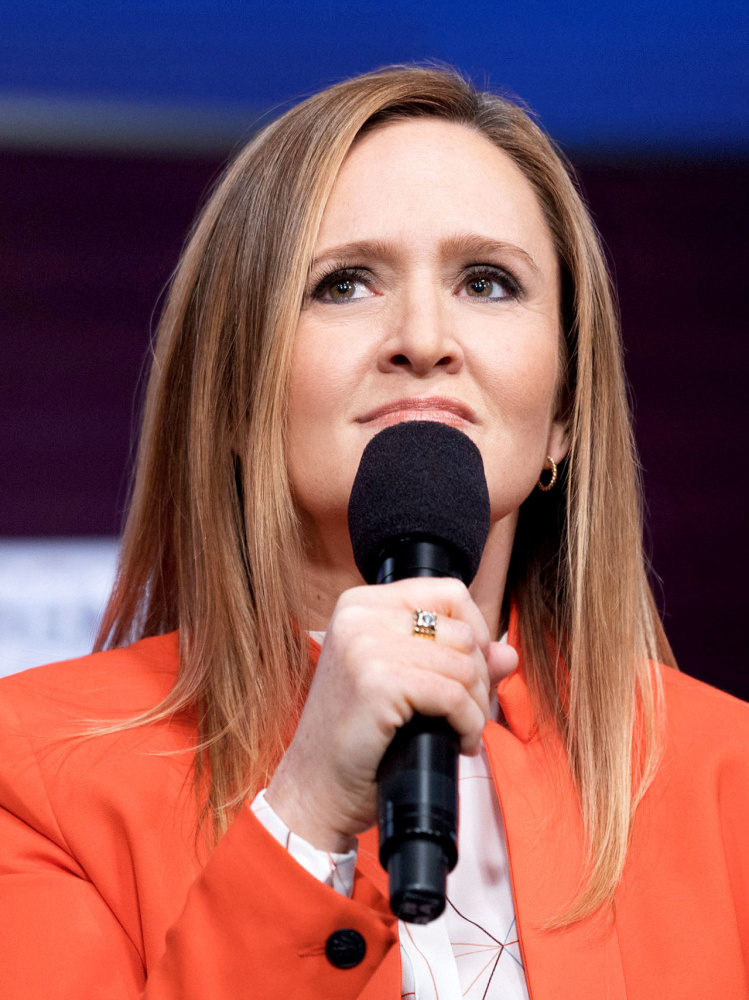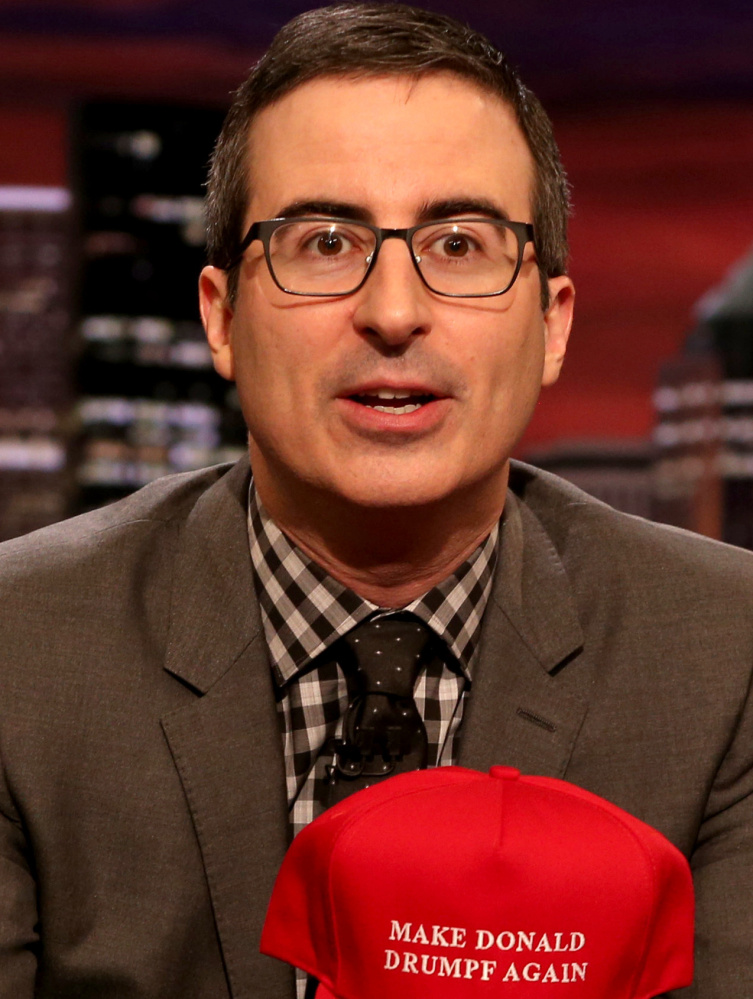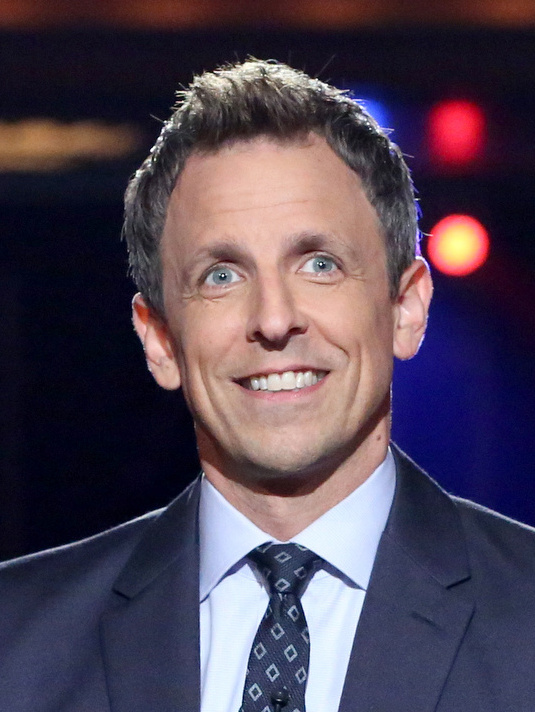late-night host
America’s garish presidential election has been a late-night host’s dream come true. The jobs are plentiful, and the jokes write themselves – so much so that everything started to look and sound the same.
Even the audiences sound the same, their laughter and applause forming prolonged Beatlemania-like squeals of agreement, a noise usually heard at actual political rallies. It’s not news to anyone that late-night, over the past four elections, became a way to excite the left and encourage the youth vote through sarcasm and satire.
Late-night audiences have been whooping and barking since the Arsenio Hall days, but this noise is different, louder, approving of the rant, the tirade, the cutting quip. While watching a recent taping of “Late Night With Seth Meyers” in Washington, D.C.’s, Warner Theatre, I was struck by how willing the audience was to over-effuse, whether producers gestured for them to do so or not, ensuring that every single punchline in Meyers’ (certainly sharp) “Weekend Update”-style opening monologue sounded as if Hillary Clinton had secured another electoral-college vote. Laughter has been replaced by shrieking assent.
The jokes also meet one another coming around the corner, unable to avoid duplication. Take Trump’s resentment over an Emmy snub, which came up during his last debate with Clinton on Oct. 19. CBS’ “Late Show” host, Stephen Colbert, made a taunting joke that night with two of his own Emmy statuettes (”You know Donald, you really should get one – they’re fantastic”) and then, four nights later on HBO, “Last Week Tonight” host John Oliver went for what is essentially the same laugh, offering to hand his own recently won Emmy statuette over to Trump in exchange for the candidate’s acceptance of the election’s results. (”That way if you lose, you still win.”)
Oliver isn’t ripping off Colbert, per se. It’s just that there are so many flies buzzing around the same piles of elephant dung, on multiple platforms, all across the overpopulated late-night comedy landscape. What a great ride it’s been for wise-asses everywhere, giving new spark to the predictable shows (HBO’s “Real Time With Bill Maher,” for example) and an easy boost to stragglers (such as Chelsea Handler’s halfhearted attempt to bring the after-hours talk format to Netflix). And what a godsend for the geeks in charge of tallying unique visitors and digital hits, as well as network executives still obsessed with claiming victory in late-night.
But the fun’s all going to end – or at least shift considerably – in a few days, and then what?
Perhaps no group becomes more vulnerable Nov. 9 than the crowd of men (Colbert and Oliver, plus Trevor Noah, Meyers, Maher, Chris Hardwick, Jimmy Fallon, Jimmy Kimmel, Conan O’Brien and – sigh – James Corden, if I absolutely must type his name) and two women (Samantha Bee and Handler) known as late-night hosts, some of them still vying to replace the void left by Jon Stewart, who retired from Comedy Central’s “Daily Show” last year. Nowhere is that burden more acutely felt than on the “Daily Show” itself, where Noah does capable work but has nevertheless drifted off the radar.
Each of these shows and their hosts are utterly dependent on viral online sharing of their political bits, sketches and diatribes to draw that still-profitable demographic known as TV viewers. For months now they have luxuriated in political humor, 90 percent of it courtesy of Trump’s campaign.
A MORE HYBRID ROLE
Not so long ago, a late-night host’s job was to merely lubricate the release valves on the news-cycle machine. Today’s late-night hosts pursue a more hybrid role – part investigative reporter and part op-ed firebrand. They also played an intimate role in viewers’ lives, as the people we chose to fall asleep with each night. Then the anxiety of politics stepped in with an onslaught of newly appointed hosts and new shows.
Enough time has passed to ask: Which one of them is doing the best job?
In some ways that can’t be answered, because we’re still trying to answer a different question: What do we want them to be? Hosts? Pundits? Should they be exclusively male and dress only in a suit and tie? Given the tenor of the times, would it be better if a black host rose to the top? Should they be true-blue American? (Noah is South African; Oliver is British, married to an American; Bee has dual Canadian-American citizenship.)
Do we want someone who is exactly like Stewart, whose die-hard fans still bemoan his departure just as Trump’s campaign took off? Or more like David Letterman, who, if he could have summoned the energy to do so, would certainly have given both candidates a sardonic vetting?
The truth is they are all talented, yet they each fall short in a different way. It’s not that we need Stewart or Letterman to come back; it’s just that we’re still mentally assembling a super-host from the options we now have. Isn’t that what the social networks do to them each morning – slice them into choice cuts?
Thirteen months into his “Late Show” run (and after a change in showrunners last spring), Colbert has made a clear case for his seasoned wit, but forget everything else – the gorgeous Ed Sullivan Theater makeover, the blue suits that match the set, the band (it’s probably great fun to catch Jon Batiste and friends in a French Quarter jazz club, but the groove never quite materializes on TV). All that effort simply dragged the show down.
Although still short of Fallon’s “Tonight Show” ratings, Colbert’s “Late Show” numbers have improved, thanks to a doubling-down on all things Trump. During the Republicans’ convention, Colbert revived the fictionally right-wing character that made him famous, delighting fans. Presumably they’ll be even more thrilled when he takes his act to Showtime for a live Election Night special that will take advantage of premium cable’s uncensored playground. But if we keep encouraging Colbert to deviate from his job description, then at some point CBS will have to revisit the task of replacing Letterman.
Colbert, who isn’t afraid of the prurient, routinely delivers some halfway funny skits and sight gags – one recent vintage example had him dragging a chalkboard out for the purposes of making “One Diagram (that) Explains Every Conspiracy Against Trump.” The diagram took on a tumescent shape that became so graphic the network blotted it out. Another typical sketch had him yukking it up one last time with President Barack Obama, who seems intent on making the rounds to each show before the election and who sat for an “exit interview” sketch and touted his job skills. As the bit sort of flailed, Obama could have likely turned the tables: Where will Colbert be come January, if Trump doesn’t win?
That question is far less dire for established veterans such as O’Brien and Kimmel, who make just enough hay with politics and are then happy to get on with the business of hosting a talk show. (Kimmel’s “Drunk Trump” is an inspired bit – as simple as taking the candidate’s most recent speech and slowing it down to half speed).
Meyers reinvigorated “Late Night” by replacing a traditional opening monologue with anchored news parody delivered from a desk – the very thing that made him famous on “Saturday Night Live,” giving viewers the kind of straightforward, Stewartesque satire they craved. Noah, meanwhile, has followed Stewart’s “Daily Show” template to a T for more than a year now, without finding his own spin on it.
Handler’s Netflix show, which streams three days a week, is easily dismissed, mainly because she seems miserable doing it. The sketches are weak and her pro-Hillary declarations are predictable and not all that funny. Yet watching it, I was reminded that I miss the unhinged and undeterred mouthiness of her “E!” talk show, which ended in 2014. Some of our hosts now are too busy being clever that they forget to be bawdy – or even just weird.
THE TWITTERATI SPEAK
If Twitterati consensus is a reliable applause-o-meter, then the two people doing the best political satire are the two who are beloved “Daily Show” alumni and can therefore lay the most claim to Stewart’s crown.
Oliver’s “Last Week Tonight” and Bee’s “Full Frontal,” the latter on TBS, are both blessed and beset by their shows’ weekly format.
Oliver’s full-throttle, commercial-free, half-hour show hardly stops for a breath, allowing his humor to tackle topics that transcend politics and travel into complicated matters of sloppy policy and unfair lawmaking.
By tossing out the idea that he needs to have guests or even concoct prerecorded newsmagazine-style segments, Oliver has found success with a genre that was more familiar to right-wing radio: the unrelenting, multi-bulleted, hyper-topical tirade. By polka-dotting his rants with jokes (every salient point and crucial news clip is enhanced with a bizarre but affable riff as a punchline), Oliver sends the medicine down with sugar, but it’s a rant all the same, and it’s not always the gentlest way to tuck viewers in on a Sunday night. Whatever he said Sunday almost uniformly begins making the rounds Monday morning.
Bee steps in Monday night with a similar approach. Limited to about 22 minutes (with commercial breaks), she zips through her sermonettes and demonstrates how vital a woman’s perspective on politics can be – and how different it is from all those men making jokes about the same debates, rallies and scandals. “Only kindergartners get credit for using their inside voices,” Bee said when others observed that Trump had opened the final debate with noticeably less bombast.
More wisely, Bee has kept the field-reporting segments that she excels at, with less of “The Daily Show’s” wink-wink spoofery and something that’s increasingly rare in late-night: You occasionally catch her in the act of listening, rather than just snarking or spouting.
Both are excellent, but it’s hard to escape the feeling of being in an echo chamber. Take the Waffle House measure, for instance: Bee and Oliver each made Waffle House jokes in different episodes recently (his came during a rant about the opioid crisis; hers was in a piece about Catholic hospitals that let dogma guide policies). When flying off the handle about one domestic dumpster fire after another, it seems all roads lead to a Waffle House joke.
That’s because there’s a shorthand language that all the writers for these shows share – one that’s not just about politics but also about class. In criticizing America, they wind up reaching for the same metaphors, and this causes them to make fun of the same things in the same ways. You can agree with all of it (or just some of it) and still get find yourself getting bored.
That’s why, when the electoral mania subsides, late-night must go on searching for its strongest, newest voice. Someone who does it all, from opening monologue to topical comedy bits to trenchant interviews to warm goodnights. Someone who can tuck America in without giving it too many more nightmares.
Send questions/comments to the editors.





Success. Please wait for the page to reload. If the page does not reload within 5 seconds, please refresh the page.
Enter your email and password to access comments.
Hi, to comment on stories you must . This profile is in addition to your subscription and website login.
Already have a commenting profile? .
Invalid username/password.
Please check your email to confirm and complete your registration.
Only subscribers are eligible to post comments. Please subscribe or login first for digital access. Here’s why.
Use the form below to reset your password. When you've submitted your account email, we will send an email with a reset code.